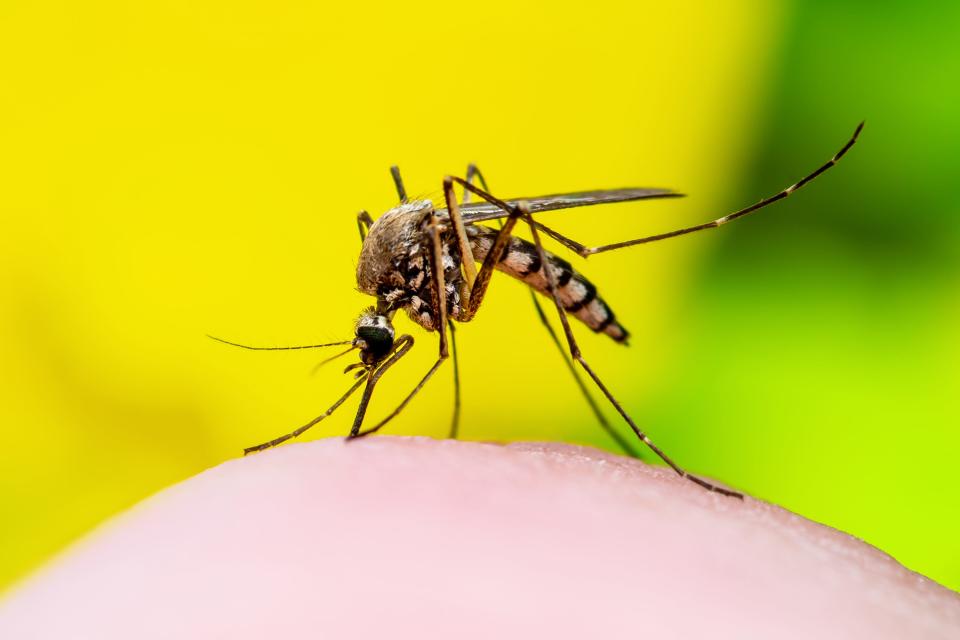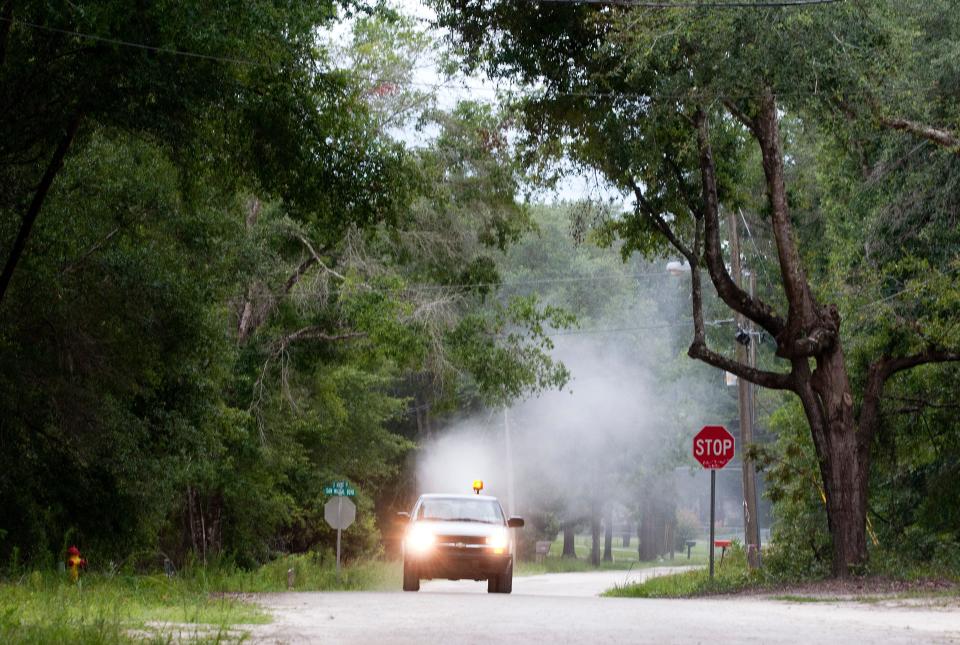It's mosquito season! Here are 9 things to know about preventing bites and more
Years ago I was fishing with a friend on the Penobscot River in Maine. We paddled our canoe into the shade in a quiet cove to eat a sandwich when we spotted two gents sitting on the shore. They were covered head to toe in mosquito netting, except for their arms. Turns out they were testing bug spray — one arm sprayed and one not. Clipboards in hand, they were just sitting there counting bug bites. I remember thinking I hoped they were being paid in Caribbean islands rather than dollars!
If you’re one of those people out there who feels like mosquito numbers have blown up in recent years, you’re not imagining things. When I looked into it, I was not surprised to find that according to some monitors, mosquito populations have grown up to 10-fold in the last 50 years. I was surprised, however, to learn that a chunk of that increase is attributed to the gradual decay of the billion-some-odd pounds of DDT sprayed during the middle part of the 20th century. Thank heavens for small things.
Now I fully realize that mosquitoes are part of the natural order of things — they serve a purpose in the grand scheme. But, if I ran the world, I’d, well, probably best not to go there.
Whatever your opinion on mosquitoes, it’s no secret their control has become a topic of debate in recent years, so I thought I’d bring a little info to the discussion.
Mosquitoes need water, but not much, to lay (hundreds!) of eggs
We all know that mosquitoes need standing water (as little as one-quarter inch!) to lay their eggs and make more baby mosquitoes. Even a single southern magnolia leaf sitting on the ground can catch plenty of rainwater to allow a mama mosquito to fill your yard with a healthy gang of offspring.
Start with one egg-laying female mosquito that can lay several hundred eggs, add one week’s time from egg to adult, and you can end up with more than a million babies in no time at all.
Mosquitoes carry a variety of diseases, including West Nile, Zika

Mosquitoes are an annoyance, no doubt. But their ability to carry and transmit assorted diseases like West Nile Virus, Zika (not to mention malaria and dengue in other parts of the world) and even heartworms in dogs, while rare in occurrence, makes some people put mosquito control high on their to-do list.
How to safely remove mosquitos from your yard, garden
When it comes to controlling mosquitoes in the home yard and garden, there are two general approaches. There are those spray treatments — either homeowner-applied or contracted service, and there are non-spray approaches. Full disclosure here so you know where I’m coming from, I’m not a fan of spray-based controls. Most products contained in those sprays are non-selective — they kill lots of other things along with mosquitoes. Plus, there are lots of things you can do to greatly limit mosquito populations without endangering the health of local pollinator insects and filling the garden with pesticides.
Let’s first look at non-spray mosquito control measures:
Eliminate standing water, wood piles to prevent mosquitos
Eliminate standing water in gutters, grill covers, window wells or any other place water can accumulate and stand for more than a day or so. Whether it’s a reflective water bowl, little bubbler fountain or a full-on pond, if it’s water, it’s breeding mosquitoes (and this includes your rain barrel that is catching water from your gutter downspouts!)
The perfect solution for these situations is what are called mosquito dunks — dry cakes of a bacterium (Bacillus thuringiensis var. israelensis) that is harmless to people, pets and most pollinators but deadly to mosquito larvae. Just float a small piece in your fountain and you’ll be set.
If you have a particularly bad mosquito problem, consider eliminating wood piles, brush piles and opening up dense foliage near the ground where mosquitoes love to linger.
Keep your lawn mowed to prevent mosquitos
Mosquitoes will hang out in long and shaggy grass, but if you keep your grass cut at a reasonable height (4 inches) they generally avoid congregating there.
Do bug repellants work to prevent mosquito bites?
When all else fails, there are tons of insect repellents you can spray on your hat or clothes and even rub on your skin if you like. You can even buy clothing with bug-repellent baked into the fabric.
All of these approaches can help to minimize mosquito populations, keep them from biting you, and they don’t have negative impacts on all those local pollinators that we love to attract to and support with our gardens.
Now we come to the spray treatments . . .
What spray treatments work to prevent mosquitos?
Two of the more commonly used pesticides approved by the Environmental Protection Agency for mosquito control around the home are permethrin and bifenthrin. Both are what are called synthetic pyrethroids — synthesized compounds that mimic some chemicals found in plants like chrysanthemums. But these mosquito-controlling compounds can be deadly to most of our insect pollinators. And while you can minimize negative impacts to pollinators, there is essentially no way to completely eliminate negative impacts to pollinators from these mosquito control sprays.
When should you start your mosquito treatment?

I called my good friend, Chris O'Bryan, of Limbwalker, a local arborist company that also offers mosquito control services. Chris is not only a great arborist, he’s also a big proponent of helping people live in harmony with their surroundings. Here are a few of his recommendations for people wanting to reduce mosquito problems and minimize impacts to people, pets, and pollinators.
Chris recommends starting your mosquito management early in the season to get ahead of it and then sticking with it. Mosquito populations can explode so fast that regular attention is key, and that’s the case whether you decide to go with spray treatments or non-pesticide options. In short, according to O’Bryan, it's better to think about managing a mosquito population than to focus on killing one crop of insects at a time.
According to O’Bryan, when it comes to spraying, crew training is critical so they know what areas to spray and what not to spray.
"Nobody should ever spray a flower garden," O’Bryan said. "Mosquitoes love to hang out in dense, shaded areas, especially close to the ground. They’re generally not hanging out in your sunny vegetable or flower garden. It drives me crazy to see people out there blasting the entire yard and garden with spray because that isn’t ever needed.”
O’Bryan’s overall preference is non-spray control measures but for his clients who call for spray treatments, he says they do their very best to minimize pollinator impacts.
Do essential oils help repel mosquitos?
A final comment on all those essential oils that are supposed to be the magic, organic mosquito treatments — peppermint, citronella, cat mint, lavender, etc. The unfortunate reality is, while you might feel good about using them, they just don’t do very much to control mosquitoes. Best to save your money on those options.
As for me, I’ll probably continue raking magnolia leaves while wearing my old straw gardening hat that stinks of bug spray!
Paul Cappiello is the executive director at Yew Dell Botanical Gardens, 6220 Old Lagrange Road, yewdellgardens.org.
This article originally appeared on Louisville Courier Journal: How to prevent mosquito bites, egg laying in the yard

